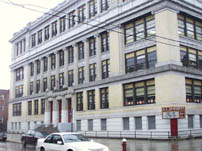School board members say that the new budget they have drafted for the 2000-2001 school year is good for taxpayers and public students alike. The $38 million budget, which provides funding to the city’s public schools, including the charter schools, will be the subject of a public hearing at the Board of Education meeting this Tuesday night at 7 p.m. It will then will go to the voters for their approval April 18. If the budget passes, the Board of Education will spend an average of $11,284 per pupil. Funding for the budget comes primarily from property taxes paid by city residents and a combination of state and federal grants. The Board anticipates needing almost $23.5 million in local taxes to cover education expenses for the next school year, an increase of just over $500,000 from last year’s totals. But Board members say that due to the fact that there are more taxpayers on the roles this year than there were last year, city residents are likely to see a very modest reduction in their tax bills. In addition to the local portion, $11.4 million in revenues are anticipated from a variety of state sources ranging from special education aid to bilingual education aid. An additional $1.8 million is expected to come to Hoboken schools through federal grants. This year’s budget is drawing rave reviews from board members who say that they have managed to find enough innovative cost-saving measures to keep the yearly budget at virtually the same level it was last year. “This is the seventh year in a row that we have presented a budget with no increase in taxes or even a slight decrease,” said School Board President David Anthony. “That is unheard of in New Jersey. Other school district’s budgets are going up even if it is just a cost of living increase. But we’ve offset inflation. We’ve offset salary increases. To me it is amazing that we can do that and have morale and test scores go up.” No mean feat School board members say that keeping a tight lid on the budget has not been easy. Since the 1970s, the number of students attending Hoboken schools has fallen dramatically from more than 10,000 to 2,200 today. The decline in enrollment put the school system in a financial vise that has been difficult to escape since it has reduced the amount of aid the district is eligible for and limited opportunities to hire new teachers at the bottom of the pay scale. Approximately half the school board’s budget is devoted to salaries. These pressures have forced board members to be creative to fund the schools without raising taxes, they say. “We’ve re-arranged the deck chairs on the Titanic several times,” said long time school board member Peter “Perry” Belfiore. “What we’ve done is we’ve made due with a significant amount less money than we used to. But I think we are going to see a shift in the salary budget soon.” “We have a bubble that is coming up in the next couple of years,” continued Belfiore, “because we have a lot of teachers that are approaching the retirement age. Right now the teacher with the least amount of seniority in our system has been there for 20 years. But I foresee an opportunity to hire new teachers soon.” Officials say that having more teachers in the classroom will reduce the teacher-to-student ratio and give children more of a chance to benefit from individualized attention. Because the city’s charter schools only began recently, they do not have so many teachers who are earning large salaries due to seniority. “They can afford to pay two teachers the amount that we are paying one,” said Belfiore. Cost savings In the meantime, officials say that they have made a number of cost-saving moves that do not compromise the quality of education at mile square public schools. In the last few years, the number of administrators overseeing the schools has been reduced, a new teachers’ union contract that limits dollars that can be paid out in lieu of sick time not taken was negotiated, and educational programs have been consolidated. More recently the school district has begun to establish a Local Area Network by laying fiber optic cables that will run between the schools. Officials say that the LAN will save the district $100,000 a year in phone bills since it allows them to make phone calls from school to school or within a school without going through the phone company. The district has also landed a $1.8 million grant through the federal government’s e-rate program to bring Internet technologies to its classrooms.
School budget bell rings: Board submits spending plan with no tax increase
